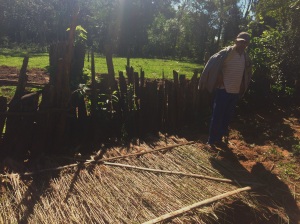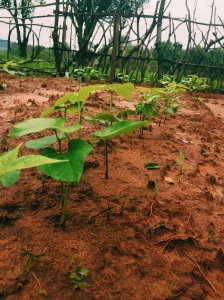I realized that I’ve gotten ahead of myself. I hit six months in site, I’ve been in-country for nine, I’ve written countless blog posts, and yet none of them really tell you what my site is like. I’ve explained occurrences, I’ve told you that I live in Itapua, I mentioned that I live near my dear friend Chara, and I’ve explained that it’s a tiny town near Encarnación, a big city with a crazy beach scene and an even crazier Carnaval. Yet, that does it no justice. So this post is dedicated to Óga Ita. To its people, to its animals, to me, even, as a resident of the beautiful ramshackle town that I call home. And as a small representation, to Paraguay, most importantly.
Óga Ita is seriously small. I have only found one other volunteer with a smaller community. It is 25 houses, mostly populated by families with the last name Baez (every one of them my siblings, cousins, nephews, and other inexplicable distant relatives) or Gonzalez (who are now marrying into the Baez clan- I fear for the gene pool). Every house is just clapboards thrown up to form a room and a front covered patio. As more money is earned and more children materialize, more boards go up and more rooms appear. You can typically and logically figure out how many children a family has, just by looking at the house. Not only by size of the house but by the laundry hanging on the barbed wire fence or the amount of chairs placed in a circle outside under a mango tree. Everyone grows things for a living and everyone is poor. They know this, but they are the happiest people I’ve ever met. They grow their own food and sell other crops like sesame and chia and soy and tung and corn and get paid almost nothing for it. Yet they have their families, they have their land, they have their animals and terere and the clothes on their backs and they live. They laugh. They have the dirtiest senses of humor. They love and love some more and even if you’re a stranger, they’ll invite you in for lunch and make sure that you get second helpings, even if there really wasn’t that much to begin with. There are two despensas where home owners sell basic goods out of their house and where I buy rice, flour, yerba, oil, eggs, and maybe a box of wine if I’ve been particularly guapo that week, but a trip to despensa is never a quick trip. You go, you sit, you converse, you terere, you laugh and gossip and when you start talking about the weather for the third time, you off-handedly mention that you need a few things. You read your list, you pay, you say gracias and muchisimas gracias and graciamante and gracias again for good measure. And then the goodbyes start and drag on and on (the Irish claim this goodbye as their own, but I think Paraguayans deserve more credit). The women grow gardens: small, wood and bamboo fenced plots filled with cabbage and carrots and lettuce and tomatoes, but more importantly with menta and boldo and burrito and kapi’i cedron and toronjil and palmita and jagua retepo and all manner of plants and herbs to remedy your terere. The properties are surrounded by trees: oranges, mandarins, limes, grapefruit, mango, avocado, papaya, guava, peach, plum, pear, and banana mixed in with flowering lapacho and eery Yvyra Rõ. As one fruit finishes its season, another moves in, creating a seamless year of fresh fruit. There are chickens everywhere. Seriously. Everywhere. And mixed in are the ducks and geese and guinea fowl and the occasional turkey. Pigs run around, rooting and digging up my lawn until you hear a high pitched squealing on Sundays and know what’s for dinner. Cows are supposed to remain in coco palm studded pastures but somehow a gate is always left open or a fence post falls down and then there’s the racous cacophony of dogs chasing them back to their rightful place on the property. The dogs. Both the best and worst animal of Paraguay. Treated solely as guardians, they’re all skin and bones and only in cities and pueblos will you find a pure-bred. Ever seeking attention and love and the rare snack, they’ll follow you, bringing their cloud of flies and fleas drawn to the ever-present injuries with them. Yet they look at you with those big brown caring eyes that just force you to give them a pat or a piece of chicken, despite the smell that they carry with them. The children, like the dogs, are always dirty. They play in the mud with such carefree mannerisms. They jump on old water jugs as trampolines and shoot small coconuts at birds with their slingshots. They play pretend and laugh and smile and gauk at the gringo but sticking my tongue out and flaring my nostrils has been a favorable way to make friends under the age of eight. They wear the hand-me-downs of the siblings before them, worn bare, mended and ripped and scrubbed and mended again. They laugh at your Guaraní and don’t speak Spanish yet, but it doesn’t matter because their laughter and a good tummy tickle is the best interaction. Their parents breathe a sigh of relief and hand over their children for an hour without question. There is always work. Sweeping, cooking, feeding, washing, hoeing, clearing, tilling, planting, watering, spraying, fixing, building. There’s always work. But there’s always time for terere and good conversation and laughter too. You wave at everyone as you pass or as they do. The man on his horse, going to his cattle pasture, the German on his tractor, going to his soy field, the teenagers on their motos, the women leading their children to school; I wave at them all with a bellowing ADIOS! The roads are dirt, dyed a rich red that marbles with the white sand after a heavy rain. The roads are all uphill, carrying you up the rolling hills of northern Itapua and providing beautifully stunning vistas of the Reserve and soy fields and citrus trees lined up in neat rows like dark polka dots on a light green expanse. The roads can go on forever, lined by the tall camerun grass and barbed wire fences and small monuments dedicated to lost family members. There is little cover until you cross the rickety bridge over the trickling arroyo, surrounded by bamboo that rises high in its leafy grandeur and curve and allows you a small pause in the cool shade. In the summer the children and their older siblings flock to the streams and frolick in the waterfalls that created the massive rock cavern that gave my community its namesake. Even the adults join in the fun when the temperatures hit mid-90s and keep bumping up and up and up. Women congregate in the shade, gossip fresh on their tongues and hidden by the straw of a guampa. Cold beer, a small bottle of sugar cane liquor or cheap boxed wine mixed with fruit flavored soda make an appearance every night at the volley cancha, where machismo reigns supreme and men prove their athleticism and discuss their multiple girlfriends and generally just exude masculinity. They go loco for futbol and pride themselves on the fact that Óga Ita’s team has made it to the district league final, three years in a row. They hold biweekly games at the makeshift cancha behind the school and Juan Carlos sells beer and gum and cigarettes out of a tiny shack while Teodoro mans the grill, procuring pork and beef and chorizo. I can hear the noise of jeers and cheers and merriment and disappointment from the moment I step out my door on the way to the partido. The people will use anything as a reason to get together, kill a pig, open a box of wine, and enjoy each other’s company, whether it be for birthdays, the anniversary of a death, a holiday, a graduation, or just a celebration of recent good luck. Paraguayans laugh and smile and show off their years in the amount of teeth they have left, but they continue to smile despite this. The children go to my one room school for First to Sixth grade, every day for half a day, unless it’s raining or there’s a teachers strike or the profesora just didn’t feel like coming. After that, they continue on with their education in the nearby town of Perlita, with its larger schools and police department and meat market (quite the metropolis- 100 houses). They leave on the 3 AM bus to Encarnación or the United (European) Colonies when they need something important and they come back on the only other bus at 3, but only if there’s money. They love their families and stay close, moving to Buenos Aires or Asunción to work for awhile, but most likely moving slowly back home to be close to mamá and papá and to breathe freely once again in the countryside, away from the people and cars and noise and grime of the city. They love each other and care for each other, putting blood and strangeness, and reputation aside if there’s need. They have taken me, the gringo, the rubio, the voluntario and the extranjero, welcomed me in, calling me by a variety of names, but also calling me their own. They are people after my own heart: they eat, they drink, they converse, they laugh, they smile, they crack jokes, and purposefully poke fun, they play, they relax, they love, they terere. This is my home, these are my people. This is Óga Ita. And this is Paraguay.


